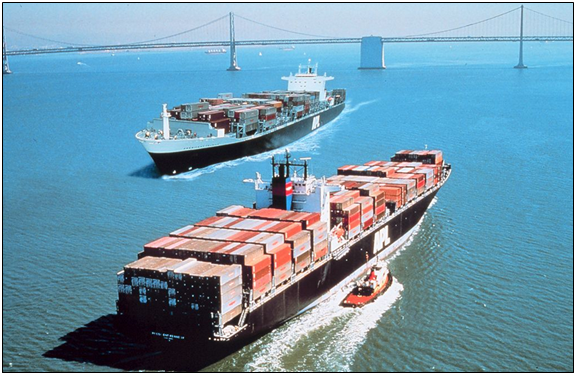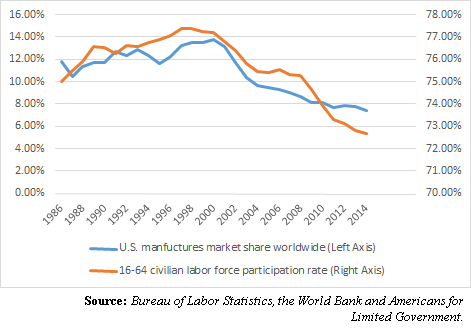While the nation’s political punditry was focused on illegal immigration as the hot-button issue for Republican presidential candidates in 2016 — with a lot of focus on Donald Trump, Ted Cruz and other candidates’ hard lines against illegal immigration — little attention was given to the international trade issue.
But after wins by Trump in Michigan, Illinois, North Carolina, Missouri and a strong second place in Ohio for Donald Trump, plus key races coming up in Wisconsin, Pennsylvania and Indiana — all states with strong manufacturing bases — trade may well end up being the real trump card in the 2016 race.
The trend has also played on the Democrat side to a lesser degree, where Bernie Sanders won Michigan largely on the strength that issue, and competed closely in Missouri and Illinois.
Anticipating these trends, Americans for Limited Government commissioned a survey by Pat Caddell at the end of February to examine voter attitudes toward international trade, which may tell us why Donald Trump is succeeding and also why Bernie Sanders may not be doing as well as many might have thought.
As it turns out, Republicans are more skeptical about free trade than either Democrats or Independents, with 59 percent of Republican voters agreeing that “Over last two decades, free trade agreements signed by the U.S. were more of a benefit to other countries.” Only 4 percent thought they benefited the U.S. more. 14 percent said they were equally beneficial.
Compare that do just 35 percent of Democrats who thought the trade deals benefited other countries more, and a combined 38 percent thought it was either equally beneficial (26 percent) or more beneficial to the U.S. (12 percent). 46 percent of Independents thought they benefited other countries more, with 24 percent saying it was either equally beneficial (15 percent) or more beneficial to the U.S. (9 percent).
What emerges is an electorate that on the whole feels it is getting a raw deal from U.S. trade policy, and results at the polls this year may be vindicating that political strategy, particularly for Trump. Less so for Sanders, perhaps because Democrats tend to find those arguments to be less persuasive. Or at least those views may be regionalized in the rust belt, whereas with Republicans, the views appear to be national across regions.
The issue has played so well among voters that it is no longer a below the radar issue. Particularly, since it now threatens what has been a bipartisan legislative consensus on Capitol Hill in favor of these large trade pacts, like the 12-nation Trans-Pacific Partnership (TPP) now under consideration. If both the Republican and Democrat candidates for president oppose the TPP, would members of Congress really come back after the election to adopt it?
Sensing its political weakness supporters of the trade deals are stepping up their defenses of U.S. trade policy, along with attacking its opponents, sometimes viciously.
Take the National Review’s Kevin Williamson, who blames the victims of globalization for not adapting to the new economic realities. “[N]obody did this to them. They failed themselves,” writes Williamson, adding, “It wasn’t Beijing. It wasn’t even Washington, as bad as Washington can be. It wasn’t immigrants from Mexico, excessive and problematic as our current immigration levels are. It wasn’t any of that… The truth about these dysfunctional, downscale communities is that they deserve to die.”
Of course, the idea that the collapse of U.S. manufacturing jobs represents a moral failure to adapt by the communities that got laid off is about as offensive as it is wrong. Was the high unemployment of the Great Depression a moral failure to adapt, too?
Since 2000, when China was granted permanent normal trade relations, the civilian labor force participation rate among 16-64 year olds has collapsed from more than a 77 percent rate at the turn of the century to just 72.6 percent in 2015, according to the Bureau of Labor Statistics. That has been right alongside declining U.S. market share globally of manufactured goods exports worldwide as a percent of worldwide exported manufactures, which peaked in 1999 at 13.48 percent, and has been declining ever since, according to data compiled by the World Bank. In 2014, it was down to 7.45 percent.
The lost labor capacity represents 10 million people who either left the labor force or never entered on a net basis. Bad policy destroyed those communities because in fact the jobs were never replaced by the service sector as was promised.
Whether reducing tariffs on countries like Vietnam or Thailand or Malaysia that utilize slave labor, thereby outsourcing production, jobs and capital to those countries and hollowing out even more our manufacturing capacity, as called for in the TPP, is good policy is a highly debatable and perhaps even dubious prospect.
Instead, it appears to be the whole point of the policy. Under world trade rules developing countries are granted what is known as “special and differential treatment,” where they get longer time periods to enact tariff reductions and implement agreements, all with the goal of boosting growth over there. Good for them, we suppose, but over here the collapse has been in jobs.
Just look at the aforementioned states that voted and will vote soon. Michigan lost 231,752 manufacturing jobs since NAFTA, a 28.3 percent drop, according to data compiled by the Bureau of Labor Statistics and Citizen.org. Ohio has lost more than 307,000 manufacturing jobs, a 31 percent drop. Illinois has lost 290,822 manufacturing job, a 33 percent drop. North Carolina has lost 359,794 manufacturing jobs, a 44 percent drop. Missouri has lost 105,798 manufacturing jobs, a 29 percent drop. Pennsylvania lost 308,684 manufacturing jobs, a 35.2 percent drop. Wisconsin lost 68,693 manufacturing jobs, a 13 percent drop. And Indiana lost 113,000 manufacturing jobs, an 18 percent drop.
All told, more than 5 million manufacturing jobs have been lost nationwide since 2000, when the brunt of the collapse began, according to the Bureau of Labor Statistics.
Whatever the supposed benefits of globalization, more growth or lower consumer prices, the cost has undeniably been outsourced labor capacity and production and capital flight overseas. And, probably, in fact, less growth. The economy has not grown above 4 percent since 2000, and not above 3 percent since 2005. 2006 to 2015 represents the worst decade of GDP since the 1930s. Is it connected to the collapse of the U.S. labor force?
If so, then the slow growth economy and weak labor market conditions can be linked directly to the shifting of production overseas that has been entirely dependent on policy enacted in Washington, D.C.
And Republican voters know it, again, with 59 percent of Republicans agreeing free trade agreements benefit other countries more than the U.S. The politics on this subject are utterly toxic for Republicans, who oppose these trade pacts more so than any other segment. Pay attention, this is important.
This is why Trump is winning. He actually speaks to people in those communities, and elitists in Washington, D.C. continue to hand wave it away, along with the illegal immigration issue. If Trump hadn’t come along, invariably the establishment would have ended up inventing somebody just like him, because they are so far out of touch they cannot even see the God’s honest truth.
Robert Romano is the senior editor of Americans for Limited Government.









